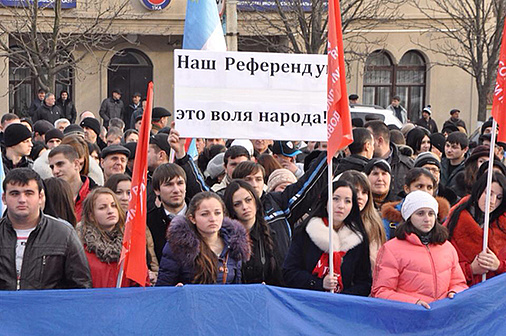Moreover, the people would be asked whether they want to join the European Union or the Customs Union, together with Russia, Belarus and Kazakhstan.
Gagauzia is located in the southern part of Moldova and enjoys a special status that was defined in 1995 by the Moldovan Law on the Special Legal Status of Gagauzia.
Despite the ruling, the Gagauz authorities refuse to comply with the legal decision taken by the higher authorities based in Chisinau. They claim they will nonetheless organize the referendum on February 2.
Socialist Party leader Igor Dodon also backs the decision of the Gagauz authorities to organize the plebiscite. He held a public meeting in Comrat last week, urging people to defy the legal ruling and organize their referendum.
“You should not fear anything,” Igor Dodon said. “Gagauzia is in favor of Moldova’s statehood, referendum and the Customs Union.”
Analysts blame the Government based in Chisinau for the current situation in Gagauzia.
Political expert Oazu Nantoi told Moldova.ORG that one should not use the word “referendum” anymore since it was deemed illegal.
“Gagauz Autonomy exists within the state of the Republic of Moldova, and 26 villages cannot claim independence from central authorities,” Mr. Nantoi said.
The expert believes that some political parties are already promoting their electoral campaign a few months ahead of parliamentary elections.
“While the Communist Party and the Socialist Party are in electoral campaign using this non-constitutional initiative, the Government is indifferent to the problem,” Mr. Nantoi added.
Political analyst Aurelian Lavric wrote in an opinion piece for Moldova.ORG that, should the referendum take place, it will be a blow to the statehood of the Republic of Moldova.
He believes that the blame for the current situation is to be attributed to the Moldovan Government which “does not have a national policy.” Mr. Lavric argues that the authorities are not interested in the Gagauz people’s grievances, the Turkic minority not being involved in the decision-making process.
“Most of the Gagauz are not integrated in the Moldovan society – they do not speak the national language [Romanian], do not take part in the decision-making process,” Mr. Lavric explained. “They are not being asked their position regarding issues of interest – for example, the initialing of the Association Agreement with the EU.”




